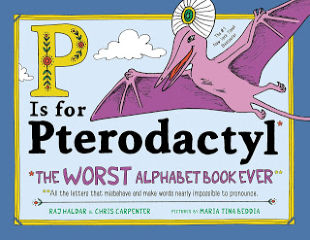Anyone who has helped students learn to read and write English knows that inconsistencies riddle the language. How do you distinguish between "isle" and "I'll" and "aisle"? Authors Raj Haldar and Christ Carpenter must have been scratching their heads and wondering the same thing in order to have come up with this glorious romp through quirks of our language or, as the sub-subtitle puts it: "All the letters that misbehave and make words nearly impossible to pronounce."
And yes, it does begin with "A is for Aisle." Immediately the whimsical appeal of Maria Tina Beddia's illustrations kicks in as we see "nine tiny beasts" — green, one-eyed, and furry, including one sporting a hair bow and spilling her purple soda — who make a mess by feasting in the bread aisle of a grocery store.
Fortunately for those of us who cannot pronounce "bdellium" or "gnocchi," there's a glossary with pronunciations in the back. The glossary definitions are straightforward, balancing out the main story's humorous lines like, "We doubt anyone knows what bdellium is, but it's the only word dumb enough to begin with a silent B." (Note the clever use of "dumb" with its own silent "b".)
If you haven't seen this book, of course you're wondering about certain letters, so we will divulge that the authors make use of "not" from time to time, like "I is not for Eye." And they don't hesitate to use names, so "Z" is for "Zhivago" who is, by the way a Zebra, appropriately sleeping with zzzz's at the end.
By the time children have absorbed this book, they'll know Djibouti is a tiny African nation that's home to one of the saltiest lakes on earth and that, in keeping with the quirky word "mnemonic," the Great Lakes are Huron, Ontario, Michigan, Erie, and Superior — HOMES. And much more. But they will have absorbed these facts — and quite a bit of unusual spelling — while having a blast.
The book is recommended for preschool through third grade ... but you will have a hard time finding a grown-up who doesn't find these pages laugh-out-loud funny.
